|
|
|
Sort Order |
|
|
|
Items / Page
|
|
|
|
|
|
|
| Srl | Item |
| 1 |
ID:
128862
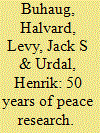

|
|
|
|
|
| Publication |
2014.
|
| Summary/Abstract |
Established in 1964, the Journal of Peace Research (JPR) celebrates 50 years. This anniversary special issue of the journal offers broad reviews of research areas that have been central both to the journal and to the field of peace and conflict research generally. An opening article co-authored by long-time editor Nils Petter Gleditsch offers a historical view on peace research and tracks trends in the use of 'peace' and 'violence' in titles of JPR across the first 49 volumes of the journal. Opening the review article section, two contributions address key thematic areas for the journal. Few if any subjects have attracted more attention in the study of international relations during the second half of JPR's first 50 years than the democratic peace, and in the extension of this subject, the broader debate about the liberal peace. Additional articles review the status and propose future developments in the study of war and its relationship with territory, ethnicity, ideology and natural resources. Another key historical topic associated with the journal concerns the economic cost of military conflict, while more recent research fields covered include terrorism and human rights, topics that have grown to become major JPR niches. Reflecting the methodological contributions by JPR, two articles focus on challenges of contemporary quantitative political analysis and progress in peace and conflict data collection. Finally, this special issue includes a review of research on international mediation in armed conflicts.
|
|
|
|
|
|
|
|
|
|
|
|
|
|
|
|
| 2 |
ID:
097753
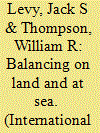

|
|
|
|
|
| Publication |
2010.
|
| Summary/Abstract |
Scholars often interpret balance of power theory to imply that great powers almost always balance against the leading power in the system, and they conclude that the absence of a counterbalancing coalition against the historically unprecedented power of the United States after the end of the Cold War is a puzzle for balance of power theory. They are wrong on both counts. Balance of power theory is not universally applicable. Its core propositions about balancing strategies and the absence of sustained hegemonies apply to the European system and perhaps to some other autonomous continental systems but not to the global maritime system. Sea powers are more interested in access to markets than in territorial aggrandizement against other great powers. Consequently, patterns of coalition formation have been different in the European system and in the global maritime system during the last five centuries. An empirical analysis demonstrates that counterhegemonic balancing is frequent in Europe but much less frequent in the global system. Higher concentrations of power in the global system lead to fewer and smaller rather than more frequent and larger balancing coalitions, as well as to more frequent and larger alliances with the leading sea power than against it.
|
|
|
|
|
|
|
|
|
|
|
|
|
|
|
|
| 3 |
ID:
116178
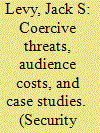

|
|
|
| 4 |
ID:
090710


|
|
|
|
|
| Publication |
2009.
|
| Summary/Abstract |
Uri Bar-Joseph and Jack S. Levy look at the different ways in which the conscious distortion of information and the politicization of intelligence can lead to intelligence failure. They apply their categories to the Soviet failure to anticipate the German attack in 1941 and to the Israeli failure to anticipate the Arab attack in 1973.
|
|
|
|
|
|
|
|
|
|
|
|
|
|
|
|
| 5 |
ID:
141967
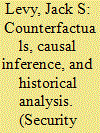

|
|
|
|
|
| Summary/Abstract |
I focus primarily on the utility of counterfactual analysis for helping to validate causal inferences in historical analysis. How can we use what did not happen but which easily could have happened to understand what did happen? With an infinite number of things that might have happened, and with temptations to construct “counterfactuals of convenience” to bolster one's preferred historical interpretations or political preferences, we need a set of rules or best practices for evaluating the scientific legitimacy of counterfactuals. Building on earlier work in several disciplines, I develop a set of criteria for the conduct of counterfactual analysis in historical case studies. The best counterfactuals begin with clearly specified plausible worlds involving small and easily imaginable changes from the real world. They make relatively short-term predictions based on empirically validated theoretical generalizations and on secondary counterfactuals that are mutually consistent. These counterfactuals are also sensitive to strategic behavior that might return history to its original course, and they are explicitly tested against competing counterfactuals.
|
|
|
|
|
|
|
|
|
|
|
|
|
|
|
|
| 6 |
ID:
105947
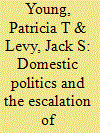

|
|
|
|
|
| Publication |
2011.
|
| Summary/Abstract |
The study of international rivalry is a thriving research program in international relations, but it focuses primarily on strategic rivalries and generally neglects both commercial rivalries and the impact of domestic politics. We examine commercial rivalry and the causal paths through which it can escalate to war. After identifying alternative theoretical explanations, we focus on the Anglo-Spanish rivalry of the 1730s and the processes through which it escalated to the War of Jenkins' Ear (1739-48). We examine both balance of power and dyadic trade rivalry explanations, and then give special attention to domestic politics in Britain. We argue that the commercial rivalry was a necessary but not sufficient condition for the war of 1739. The Walpole ministry was opposed to war, and the rivalry would not have escalated in the absence of domestic pressures from mercantile interests, a xenophobic public, a politically opportunistic parliamentary opposition, and a divided cabinet.
|
|
|
|
|
|
|
|
|
|
|
|
|
|
|
|
| 7 |
ID:
079397
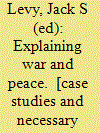

|
|
|
|
|
| Publication |
London, Routledge, 2007.
|
| Description |
xvi, 346p.
|
| Standard Number |
9780415422321
|
|
|
|
|
|
|
|
|
|
|
|
Copies: C:1/I:0,R:0,Q:0
Circulation
| Accession# | Call# | Current Location | Status | Policy | Location |
| 052606 | 303.66/LEV 052606 | Main | On Shelf | General | |
|
|
|
|
| 8 |
ID:
069867
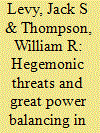

|
|
|
|
|
| Publication |
2005.
|
| Summary/Abstract |
The central proposition of balance-of-power theory (albeit one that has never been tested systematically) is that great powers balance against hegemonic threats. This article argues that this proposition applies to hegemonic concentrations of land-based military power in autonomous continental systems, but not necessarily to hegemonic concentrations of sea power in maritime systems. With a focus on continental systems, this article develops and tests several hypotheses linking military concentration, capability changes, and alliance responses for the European system from 1495 to 1999. Judging from existing data on army concentrations and a new database of great-power alliances since 1495, European great powers have demonstrated a strong propensity to balance when one state has acquired a third or more of the total military capabilities in the system, but not at lower concentrations of power; higher concentrations of power usually lead to larger balancing coalitions. Great powers do not always balance, however, so balancing is a probabilistic tendency rather than an "iron law" of behavior.
|
|
|
|
|
|
|
|
|
|
|
|
|
|
|
|
| 9 |
ID:
148150
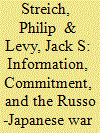

|
|
|
|
|
| Summary/Abstract |
We apply a modified version of the bargaining model of war to the outbreak of the Russo-Japanese War of 1904–1905. We conceptualize the informational path to war as a two-step process, the first identifying the sources of informational asymmetries, and the second specifying the causal linkages between informational asymmetries and war. The sources of informational asymmetries include not only private information and incentives to misrepresent that information, but also individual, societal, and governmental-level factors. We argue that the primary causes of the Russo-Japanese War involved a combination of the commitment problem and preventive logic arising from Russia's growing power relative to that of Japan, and informational problems arising from disagreements about relative power and resolve. These disagreements arose almost exclusively from Russian political and military leaders' underestimation of Japanese capabilities and resolve, and they generated highly intransigent Russian bargaining behavior. Russia misperceptions can be traced primarily to racial and cultural stereotypes and psychological biases, and to competition between rival domestic and bureaucratic factions that distorted information flows, created an incoherent decision-making process, and sent confusing signals to Japan.
|
|
|
|
|
|
|
|
|
|
|
|
|
|
|
|
| 10 |
ID:
103940
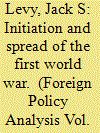

|
|
|
|
|
| Publication |
2011.
|
| Summary/Abstract |
The ConflictSpace framework begins with the assumption that the factors leading a war to spread are different from the factors leading to the initiation of war. I argue that the presumed analytic separation of the initiation and spread of war is misleading because leaders' expectations of how a war might spread have a significant effect on their decisions to initiate war. I demonstrate this for the July 1914 crisis, and in the process I question Vasquez et al.'s argument that the key to the outbreak of the war lies in the Austro-Serbian relationship. I end by suggesting that the impact of the anticipated spread of war on the initiation of war probably varies across cases and constitutes an empirical question to investigate.
|
|
|
|
|
|
|
|
|
|
|
|
|
|
|
|
| 11 |
ID:
136609
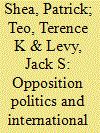

|
|
|
|
|
| Summary/Abstract |
Democratic foreign policy choices are a function of expected international outcomes and the preferences, power, and information of domestic actors. Studies of domestic political competition and international crisis bargaining have argued that an opposition's policy positions send credible signals of the government's intentions to adversarial target states. This paper contends that while opposition behavior may send informative signals, it can also directly constrain the policy options of the government. We relax previous assumptions that the opposition cannot directly prevent war or influence the outcomes of war (Schultz 2001). Instead, we assume that the opposition controls some political resources and attempts to influence the government's policy decisions in a way that advances its own partisan interests. To empirically demonstrate the theoretical differences in our model in comparison with previous domestic opposition models, we examine the case of the Quasi-War of 1798 between the United States and France.
|
|
|
|
|
|
|
|
|
|
|
|
|
|
|
|
| 12 |
ID:
179372
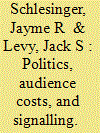

|
|
|
|
|
| Summary/Abstract |
Audience costs theory posits that domestic audiences punish political leaders who make foreign threats but fail to follow through, and that anticipation of audience costs gives more accountable leaders greater leverage in crisis bargaining. We argue, contrary to the theory, that leaders are often unaware of audience costs and their impact on crisis bargaining. We emphasise the role of domestic opposition in undermining a foreign threat, note that opposition can emerge from policy disagreements within the governing party as well as from partisan oppositions, and argue that the resulting costs differ from audience costs. We argue that a leader's experience of audience costs can trigger learning about audience costs dynamics and alter future behaviour. We demonstrate the plausibility of these arguments through a case study of the 1863–4 Schleswig-Holstein crisis. Prime Minister Palmerston's threat against German intervention in the Danish dispute triggered a major domestic debate, which undercut the credibility of the British threat and contributed to both the failure of deterrence and to subsequent British inaction. Parliament formally censured Palmerston, contributing to a learning-driven reorientation in British foreign policy.
|
|
|
|
|
|
|
|
|
|
|
|
|
|
|
|
| 13 |
ID:
082055
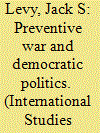

|
|
|
|
|
| Publication |
2008.
|
| Summary/Abstract |
define the concept of preventive war, distinguish it from preemption and other sources of better-now-than-later logic, and examine numerous conceptual issues that confound theoretical and empirical analyses of prevention. I then consider the argument that democracies rarely if ever adopt preventive war strategies because such strategies are contrary to the preferences of democratic publics and to the values and identities of democratic states. I examine a number of historical cases of anticipated power shifts by democratic states, and analyze the motivations for war and the mobilization of public support for war. The evidence contradicts both the descriptive proposition that democracies do not adopt preventive war strategies and causal propositions about the constraining effects of democratic institutions and democratic political cultures.
|
|
|
|
|
|
|
|
|
|
|
|
|
|
|
|
| 14 |
ID:
076999
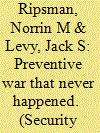

|
|
|
|
|
| Publication |
2007.
|
| Summary/Abstract |
The theory of "preventive war" states that, under certain conditions, states respond to rising adversaries with military force in an attempt to forestall an adverse shift in the balance of power. British and French passivity in response to the rapid rise of Germany in the 1930s would appear to constitute one of the leading empirical anomalies in the theory, one the theory's proponents must explain. After clarifying the meaning of the preventive motivation for war and specifying the conditions under which it should be the strongest, we examine French and British behavior in the crises over the Rhineland in 1936 and Sudeten Czechoslovakia in 1938 through an intensive study of government documents and private papers. We argue that French political leaders, anticipating a continuing adverse shift in relative power, wanted to confront Hitler, but only with British support, which was not forthcoming. British leaders believed, even by 1936, that the balance of power had already shifted in Germany's favor, but that German ascendancy was only temporary and that British rearmament would redress the balance of power in a few years. We contrast our argument with alternative interpretations based on domestic political pressures and ideologically driven beliefs and interests
|
|
|
|
|
|
|
|
|
|
|
|
|
|
|
|
| 15 |
ID:
153326
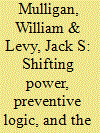

|
|
|
|
|
| Summary/Abstract |
If a declining state has incentives for preventive war, the rising state should have incentives to delay a confrontation until it is stronger. We develop the theoretical paradox and examine the July 1914 crisis. Why did Russia, rising relative to Germany, not adopt a buying-time strategy? We argue that although most Russian leaders hoped to avoid a confrontation, they feared that the failure to support Serbia would lead to a loss of Russian credibility and a significant setback to Russia’s position in the Balkans, one that could not easily be reversed, even with Russia’s expected increase in relative military power.
|
|
|
|
|
|
|
|
|
|
|
|
|
|
|
|
| 16 |
ID:
193172
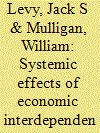

|
|
|
|
|
| Summary/Abstract |
Empirical research generally supports the dyadic-level trade-promotes-peace hypothesis, while demonstrating that the relationship is weaker, more complex, and more conditional than liberal theory suggests. We shift to the system level and examine a neglected path to conflict in economically interdependent systems. In the great power competition for support among smaller states, a great power at a competitive disadvantage in economic instruments of influence may be incentivised to adopt more militarised strategies. We illustrate our argument with case studies of Austro-Hungarian and Russian influence strategies before the First World War and of Prussian strategies among German states before the Franco-Prussian War.
|
|
|
|
|
|
|
|
|
|
|
|
|
|
|
|
| 17 |
ID:
060974
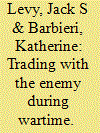

|
|
|
| 18 |
ID:
180456
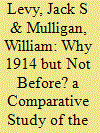

|
|
|
|
|
| Summary/Abstract |
Why did the July 1914 crisis—but not crises in 1905, 1908–9, 1911, and 1912–13—escalate to great-power war despite occurring under similar international and domestic conditions? Explanations based on underlying and slowly changing structural, social, or cultural variables cannot answer this question. Examining three Balkan crises of 1912–13 and the July Crisis, we refine realist explanations based on power, alliances, and reputational interests by incorporating the impact of changing power distributions and alliances in the Balkans on the great-power security system. A more complete answer to the why-1914-but-not-before question, however, requires the incorporation of Franz Ferdinand’s assassination, which went beyond a pretext for war. It eliminated the most powerful and effective proponent for peace in Vienna and fundamentally changed the nature of the decision-making process in Austria-Hungary. Counterfactually, we argue that a hypothetical crisis with Franz Ferdinand present would probably have ended differently.
|
|
|
|
|
|
|
|
|
|
|
|
|
|
|
|
| 19 |
ID:
083706
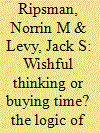

|
|
|
|
|
| Publication |
2008.
|
| Summary/Abstract |
Scholars typically define appeasement as a policy of satisfying grievances through one-sided concessions to avoid war for the foreseeable future and, therefore, as an alternative to balancing. They traditionally interpret British appeasement of Adolf Hitler in the 1930s as a naïve attempt to maintain peace with Germany by satisfying his grievances. The standard conceptualization of appeasement and the empirical treatment of the 1930s, however, are theoretically limiting and historically incorrect. Appeasement is a strategy of sustained, asymmetrical concessions with the aim of avoiding war, at least in the short term. There are three distinct variations of appeasement: (1) resolving grievances (to avoid war for the foreseeable future); (2) diffusing secondary threats (to focus on a greater threat); and (3) buying time (to rearm and/or secure allies against the current threat). British appeasement was primarily a strategy of buying time for rearmament against Germany. British leaders understood the Nazi menace and did not expect that appeasement would avoid an eventual war with Germany. They believed that by the time of the Rhineland crisis of 1936 the balance of power had already shifted in Germany's favor, but that British rearmament would work to reverse the balance by the end of the decade. Appeasement was a strategy to delay an expected confrontation with Germany until the military balance was more favorable.
|
|
|
|
|
|
|
|
|
|
|
|
|
|
|
|
|
|
|
|
|